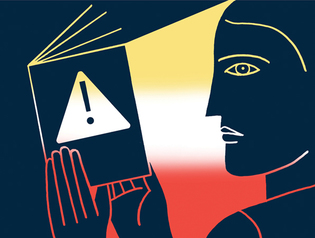
Anthony Russo
Among the many active battle zones of the culture wars, one you can count on is higher education. So it was no surprise that when the Cornell Student Assembly put forth a resolution this spring calling for mandated content warnings on potentially triggering course material, both outrage and vociferous support ensued.
The measure, which the assembly approved unanimously, asked faculty to issue syllabus content warnings “for any traumatic content that may be discussed, including but not limited to: sexual assault, domestic violence, self-harm, suicide, child abuse, racial hate crimes, transphobic violence, homophobic harassment, xenophobia.” It also stipulated that students “who choose to opt out of exposure to triggering content” would face no penalty “contingent on their responsibility to make up any missed content.” Cornell president Martha E. Pollack vetoed the measure within ten days, prompting peer institutions to reflect on best practices for maintaining freedom of inquiry while addressing students’ well-being.
At Yale, the verdict on content warnings—from student leaders, the university administration, and in-house experts on pedagogy and mental health—is a qualified no.
“I think we have a pretty straightforward policy,” says Yale College dean Pericles Lewis, “which is that faculty are free to say whatever they like on their syllabus and in their classroom about the content of their classes.” He adds that “a good number of faculty do feel that letting students know that challenging material is coming up” is a useful practice. And there’s a sense of “decorum” among the faculty, he says, many of whom think it’s more appropriate to give information than to deliver a warning.
Paul Hoffman, director of mental health and counseling at Yale Health, also favors the qualified no. “Applied too broadly, you’re signaling students that they ought to be anxious, and they approach learning in a more anxious way,” he says. “A broad mandate for trigger warnings on all sorts of things becomes counterproductive.” Furthermore, Jennifer Frederick ’99PhD, director of the Poorvu Center for Teaching and Learning, notes that the most recent research indicates trigger warnings don’t do much to reduce trauma.
And on the student level, the leadership of the Yale College Council doesn’t consider content warnings top of mind. YCC vice president Maya Fonkeu ’25 says she has sometimes had to take a few minutes after class to process, “because the material was really upsetting—not because it’s something that I shouldn’t be hearing, but because it’s just the reality of what that history looks like.”
Fonkeu and other students at Yale expressed both a commitment to academic freedom and the importance of mental health resources to help students who are retraumatized by course material. Further, most don’t see academic freedom and mandated content warnings as necessarily mutually exclusive.
“When students do encounter difficult material—and of course we want them to engage with challenging issues—they can turn to their instructors or to the residential college deans for support,” says Lewis. “The college is a community dedicated to learning through the free exchange of ideas, and also one that tries to be supportive of all members of the community.”
 loading
loading
1 comment
-

John Calhoun, 10:27pm June 28 2023 |  Flag as inappropriate
Flag as inappropriate
The comment period has expired.The fact that this is even a question shows how utterly ridiculous and contemptible these institutions are. I can't think of a less estimable group of people than these pathetic students. Good riddance to them all.